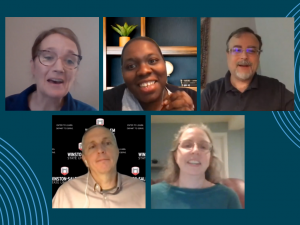
Educators from minority-serving institutions (MSI) and community colleges across the southeast led panels about how they utilize resources from the University of North Carolina at Chapel Hill and Duke area studies centers to advance global scholarship and integrate global curricula in their classrooms. The “Connecting Your Classroom to the World” virtual symposium on May 12 featured speakers representing five institutions, including one historically American Indian university, three Historically Black Colleges and Universities (HBCU) and a community college. Virtual attendees joined from six HBCUs, nine community colleges, one Native-American serving non-tribal institution, and one minority-serving university, across five states.
The area studies centers provide essential services and resources for instruction, learning and research related to global issues, world regions and modern foreign languages. They serve as national resource centers, deepening and expanding the understanding of the world and the importance of global education. They provide outreach to educators and institutions across the country, including support and resources for MSI faculty and community colleges. Resources include curriculum development awards, digital resources, research travel awards and regional studies networks. They also connect faculty with the NC Scholar of Global Distinction program, a partnership between North Carolina community colleges and UNC World View.
Making Connections Across Borders
In the first session of the symposium, “Making Connections Across Borders,” three panelists explained how they have connected with international institutions using Carolina and Duke area studies resources.
As the only geographer at Winston-Salem State University (WSSU), Russell Smith, professor of geography in the Department of History, Politics and Social Justice and faculty lead for the Spatial Justice Studio at the Center for Design Innovation, works to bring a spatial justice lens to urban geography. When travel is no longer constrained due to the COVID-19 pandemic, Smith plans to use funding from the Center for European Studies to travel to Europe to engage with spatial justice scholars. He noted that spatial justice takes different forms depending on location. For example, injustices in Washington, D.C. might be rooted in race, he explained, but in parts of Europe, spatial injustices are caused by income inequality and migration.
“We’re trying to incorporate and cover all those different ways of understanding spatial injustice in different contexts,” Smith said. His hope is that this understanding will help students lead work toward more just geographies.
Matthew Cook, professor of postcolonial and South Asian studies at North Carolina Central University (NCCU), uses funding from the Carolina Asia Center and Duke to bring Pakistani scholars to NCCU and vice versa. Faculty from both countries are interested in developing people-to-people interactions, which will ultimately influence the curriculum, according to Cook.
For Rose Sackeyfio, associate professor of English at WSSU, the Carolina Asia Center and African Studies Center at UNC-Chapel Hill supported her incorporation of global content in her women’s studies courses and provided professional development opportunities in research and scholarship. In one of her courses, Women’s Writing in a Global Context, Sackeyfio incorporates global content by examining literature by Indian, African and Muslim women writers with her students. Funding from the centers allowed her to attend conferences in Ghana and China, which in turn helps her develop both as a researcher and an educator. Sackeyfio expressed gratitude for the area studies centers resources.
“It’s an invaluable opportunity,” commented Sackeyfio on the ability to work with the centers.
Tailoring the Global to Your Local
In the second session, “Tailoring the Global to Your Local,” panelists shared how they have utilized resources to make global education more accessible to their students.
Shannon Hahn, chair of foreign languages and Spanish instructor at Durham Technical Community College, has been working with various area studies centers since 2015. Hahn spoke about how she utilizes funding and professional resources from the Carolina Asia Center and the Center for Middle East and Islamic Studies at UNC-Chapel Hill to increase library and instructional materials and help faculty incorporate global components in their own courses.
“Funding support has been transformational in many ways,” Hahn said.
Panelist Shearon Roberts, associate professor of mass communication at Xavier University in Louisiana, noted that study abroad programs are often inaccessible for many HBCU students. As a 2019 College Educators Research Fellow of the UNC-Duke Consortium in Latin American and Caribbean Studies, Roberts addresses this gap by using fellowship resources to show her students that global can be local. As part of her teaching, she draws connections between Xavier students and Caribbean culture and heritage through music, law and geography.
With the resources available to Roberts as a fellow, her students can connect “through their own entry point into understanding Latin America and the Caribbean” and enhance their understanding of Black lived experiences in the Americas in relation to their own experiences here in the United States, Roberts explained.
Working with Carolina’s Center for European Studies, Melissa Buice, assistant professor of political science and public administration at the University of North Carolina at Pembroke, teaches international dynamics with a focus on Latin America and Europe. Buice discussed the challenges facing MSIs in the rural south, especially during the COVID-19 pandemic. She explained that many students do not have the opportunities or resources to travel, but with the use of virtual reality (VR), Buice can take her students around the world without ever leaving the classroom. Buice used funding from the Center for European Studies to purchase VR equipment. She explained that these virtual excursions instill empathy and cultural competency in her students despite not visiting the sites in person. And now her students are creating virtual excursions themselves to use in K-12 classrooms.
The event was organized in collaboration between the African Studies Center; Carolina Asia Center; Center for European Studies; Duke-UNC Consortium for Middle East Studies; and UNC-Duke Consortium in Latin America & Caribbean Studies with support from the U.S. Department of Education. A video recording of the program can be found on the Center for European Studies’ YouTube channel.
Posted from https://global.unc.edu/news-story/unc-and-duke-area-studies-centers-support-globalizing-curricula-across-minority-serving-institutions-and-community-colleges/